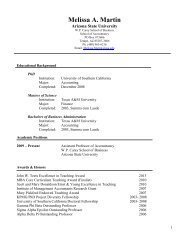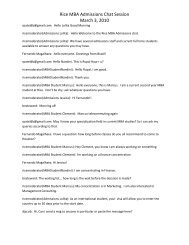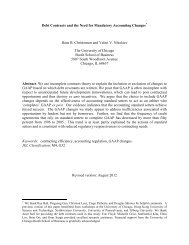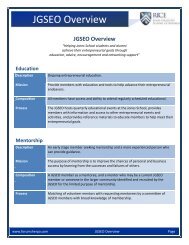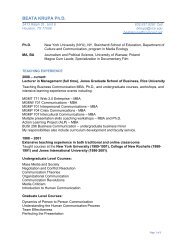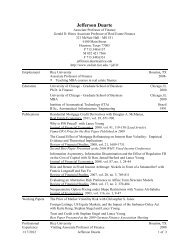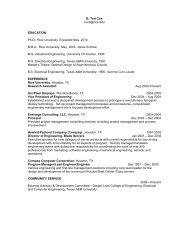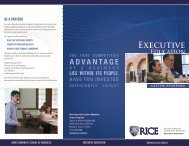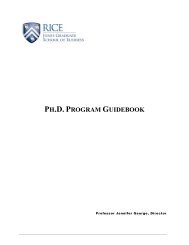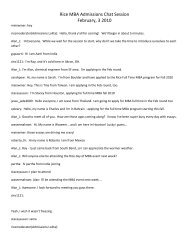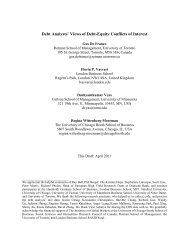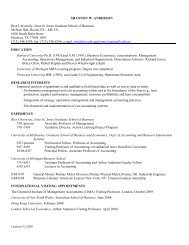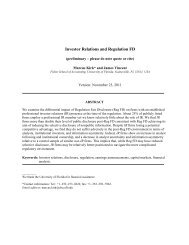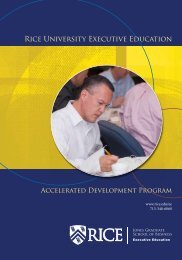Fall 2012 - Jesse H. Jones Graduate School of Management - Rice ...
Fall 2012 - Jesse H. Jones Graduate School of Management - Rice ...
Fall 2012 - Jesse H. Jones Graduate School of Management - Rice ...
Create successful ePaper yourself
Turn your PDF publications into a flip-book with our unique Google optimized e-Paper software.
The Parliament<br />
NEWSLETTER OF THE JONES GRADUATE SCHOOL OF BUSINESS ACCOUNTING GROUP<br />
MANY VOICES AT THE TABLE<br />
WOMEN AND LEADERSHIP<br />
Jim Turley and Karen Nelson join forces at <strong>Jones</strong> Partners<br />
Thought Leadership Series<br />
<strong>Fall</strong> <strong>2012</strong><br />
Master <strong>of</strong> Accounting Relaunch pg 3 | PCAOB Public Meeting pg 5<br />
Jim Doty in his Own Words pg 6<br />
business.rice.edu/accounting
The Parliament<br />
A “parliament” is the literary collective noun for a group <strong>of</strong> owls. Similarly, the name <strong>of</strong> our<br />
newsletter reflects the collective spirit and wisdom <strong>of</strong> <strong>Rice</strong> Owls personified by the alumni,<br />
faculty and friends <strong>of</strong> the <strong>Jones</strong> <strong>Graduate</strong> <strong>School</strong> <strong>of</strong> Business accounting group.<br />
JONES GRADUATE SCHOOL OF BUSINESS<br />
ACCOUNTING GROUP<br />
Area Coordinator<br />
Karen Nelson<br />
nelsonk@rice.edu<br />
Ph.D. Program Director<br />
Thomas Hemmer<br />
thomas.hemmer@rice.edu<br />
TENURED/TENURE-TRACK FACULTY<br />
Brian Akins<br />
Steve Crawford<br />
Thomas Hemmer<br />
Karen Nelson<br />
K. Ramesh<br />
Brian Rountree<br />
Shiva Sivaramakrishnan<br />
Sally Widener<br />
Steve Zeff<br />
CLINICAL FACULTY<br />
Marc Epstein<br />
PART-TIME FACULTY<br />
Lanny Chasteen<br />
Dick Viebig<br />
ADMINISTRATION<br />
Dean<br />
Bill Glick<br />
bill.glick@rice.edu<br />
Assistant Dean <strong>of</strong> External Relations<br />
Ben Renberg<br />
ben.renberg@rice.edu<br />
NEWSLETTER EDITOR<br />
Weezie Mackey<br />
wmackey@rice.edu<br />
business.rice.edu/accounting<br />
Ben Renberg<br />
Assistant Dean <strong>of</strong> External Relations<br />
When Ben Renberg, assistant dean <strong>of</strong><br />
external relations, arrived at the <strong>Jones</strong><br />
<strong>School</strong> in 2010, he was met by excited and<br />
enthusiastic alumni. One <strong>of</strong> those groups<br />
was Master <strong>of</strong> Accounting (MAcc) alumni.<br />
The dedication and commitment to <strong>Rice</strong> by<br />
these alumni years after the sunset on the<br />
program was amazing. At that same time,<br />
Dean Glick and the accounting faculty<br />
were studying a possible relaunch <strong>of</strong> the<br />
program. After reviewing the landscape<br />
<strong>of</strong> the accounting field with alumni,<br />
public accounting firms and corporate partners, a unique opportunity for<br />
<strong>Rice</strong> was identified. The conversation around the MAcc reached beyond<br />
accounting skills into developing corporate leaders. With close inspection<br />
<strong>of</strong> the demand for and ultimate success <strong>of</strong> the graduates from the MAcc<br />
program, the solution was clear — all signs pointed to a <strong>Rice</strong> relaunch.<br />
First <strong>of</strong>fered when the newly minted <strong>Jones</strong> <strong>School</strong> absorbed <strong>Rice</strong>’s existing<br />
department <strong>of</strong> accounting in 1975, the MAcc awarded nearly 300 degrees<br />
until the spring <strong>of</strong> 1997. The program was known for its student diversity,<br />
blend <strong>of</strong> academic and practitioner faculty, and small class size. With a<br />
thoughtful look at the program’s past and an eye to the future, the formal<br />
process for the relaunch commenced.<br />
The great news is the <strong>Jones</strong> <strong>School</strong> has successfully begun other programs<br />
over the past five years, including a Ph.D. program, an undergraduate<br />
business minor, and an MBA for Pr<strong>of</strong>essionals program. In the months<br />
ahead, look for more information on the progress <strong>of</strong> the MAcc relaunch.<br />
Alumni involvement is key. In consideration <strong>of</strong> what makes a relaunch<br />
successful, the <strong>Jones</strong> <strong>School</strong> faculty, alumni and the corporate community<br />
are all needed to make this happen.<br />
With a vision to develop ethical, competent leaders, the <strong>Rice</strong> MAcc has<br />
the potential to fundamentally impact the global accounting pr<strong>of</strong>ession.<br />
The opportunity to create this impact will not only attract top students, top<br />
faculty and top employers, it will endeavor to make our MAcc alumni proud.
Welcome<br />
Back MAcc<br />
The <strong>Jones</strong> <strong>Graduate</strong> <strong>School</strong> <strong>of</strong> Business is<br />
thrilled to announce the relaunch <strong>of</strong> the Master<br />
<strong>of</strong> Accounting (MAcc) proram slated for the fall<br />
<strong>of</strong> 2016. Having <strong>of</strong>fered the MAcc from 1975-<br />
1997 and with alumni from that program in<br />
positions that influence the entire pr<strong>of</strong>ession, the<br />
<strong>Jones</strong> <strong>School</strong> is <strong>of</strong>fering an elite, graduate level<br />
accounting degree program designed to build<br />
future leaders in the accounting pr<strong>of</strong>ession.<br />
The school recognizes the increased importance<br />
<strong>of</strong> accounting as it pertains to the overall face <strong>of</strong><br />
business. In a time when corporate accountability,<br />
transparency and reporting are increasing in<br />
priority, there is demand for highly-trained<br />
accounting pr<strong>of</strong>essionals with critical thinking<br />
skills, integrity, and global leadership experience<br />
now more than ever.<br />
There are few schools in the nation with<br />
accounting faculty as revered and respected<br />
as those currently in the accounting area at<br />
the <strong>Jones</strong> <strong>Graduate</strong> <strong>School</strong> <strong>of</strong> Business. For<br />
the second consecutive year, the <strong>Jones</strong> <strong>School</strong><br />
has ranked 9th globally for accountancy in the<br />
Financial Times. The opportunity to focus the<br />
research talent and reputational momentum<br />
into an accountancy-focused graduate degree<br />
program will allow for the next generation <strong>of</strong><br />
ethical, competent leaders to emerge in the<br />
global accounting pr<strong>of</strong>ession.<br />
The Master <strong>of</strong> Accounting degree at <strong>Rice</strong> University<br />
will be unique in its creative approach, blending<br />
concepts together so the content <strong>of</strong> courses and<br />
how and by whom they are taught fundamentally<br />
impacts the program and the pr<strong>of</strong>ession.<br />
Through a compelling curriculum <strong>of</strong> historical,<br />
practical and theoretical components in auditing,<br />
accounting and all aspects <strong>of</strong> financial reporting<br />
as well as high level instruction in writing and<br />
communication, students will gain a unique<br />
perspective, just as has been done historically by<br />
<strong>Rice</strong> and the <strong>Jones</strong> <strong>Graduate</strong> <strong>School</strong> <strong>of</strong> Business<br />
through all masters’ degree <strong>of</strong>ferings.<br />
4 3 |<br />
<strong>Rice</strong> University’s<br />
Centennial Celebration<br />
PRESIDENT DAVID LEEBRON began his centennial address October 12 from a<br />
stage that was a replica <strong>of</strong> the one on which founding president Edgar<br />
Odell Lovett spoke. Leebron welcomed the first students and faculty the<br />
same way Lovett did in the fall <strong>of</strong> 1912, to an audience that included<br />
delegates <strong>of</strong> more than 100 universities from around the world.<br />
During the Centennial celebration, approximately 40,000 alumni,<br />
family and friends from around the world descended on <strong>Rice</strong>’s campus<br />
to celebrate the university’s remarkable 100-year milestone. More than<br />
28,000 spectators watched the Owls dominate the USTA Roadrunners<br />
in the centennial and homecoming football game. Thousands more were<br />
thrilled by the light-and-sound Spectacle in the academic quadrangle<br />
and by the Shepherd <strong>School</strong>’s world premiere <strong>of</strong> American composer<br />
William Bolcom's “Ninth Symphony.” Alumni set new records in<br />
class giving and homecoming attendance, and the centennial lecturers<br />
were as visionary and provocative as billed. And that was just a slice <strong>of</strong><br />
the action.<br />
In concluding his address, Leebron said, “As we enter our second<br />
century and face the opportunities ahead, we must be bold; we must be<br />
entrepreneurial; we must be collaborative; we must be fast and slow; we<br />
must be international yet distinctively American; we must be the great<br />
research university that preserved its dedication to its students; we must<br />
be <strong>Rice</strong>.”<br />
Alumni News<br />
“After nearly 30 years with Deloitte, I ‘retired’ (because with my age<br />
and tenure, that’s what they call it when you leave!) to open my own<br />
(small) firm, Parker Bond Consulting L.L.C. Doing the same thing<br />
I’ve done for 25 years, but now with only one boss: the client!”<br />
— Andy Parker, B.A. ’81, MAcc ‘82
Faculty Updates<br />
BRIAN AKINS taught the financial accounting core course in<br />
the MBA for Pr<strong>of</strong>essionals program. On the research front,<br />
he has started a new project related to competition in the<br />
banking sector and a second examining how firms’ debt<br />
structures affect yield spreads in the public bond market.<br />
STEVE CRAWFORD is currently working on two new papers that<br />
examine buy-side analysts and their use <strong>of</strong> technology to<br />
facilitate idea sharing.<br />
THOMAS HEMMER presented his paper “Optimal Relative<br />
Performance Evaluation” at the Stanford University Summer<br />
Accounting Research Camp. He gave an invited plenary talk<br />
entitled "Optimal Managerial Performance Evaluation: Failed<br />
Predictions and Resulting Opportunities" at the APMAA<br />
Conference held at Xiamen University, China. His paper<br />
“On the Stewardship and Valuation Implications <strong>of</strong> Accrual<br />
Accounting Systems” was accepted for publication in the<br />
Journal <strong>of</strong> Accounting Research.<br />
KAREN NELSON presented her latest research paper “On the<br />
Persistence and Pricing <strong>of</strong> Industry-Wide and Firm-<br />
Specific Earnings, Cash Flows, and Accruals” in seminars<br />
at the University <strong>of</strong> Arkansas, University <strong>of</strong> Colorado, and<br />
University <strong>of</strong> North Carolina. Her paper “The Relation<br />
Between Auditors’ Fees for Nonaudit Services and Earnings<br />
<strong>Management</strong>” was recognized as one <strong>of</strong> the 50 most<br />
influential accounting research papers published in the past<br />
15 years based on an analysis <strong>of</strong> citations in nine leading<br />
accounting journals.<br />
K. RAMESH completed his term as president <strong>of</strong> the Financial<br />
Accounting and Reporting Section <strong>of</strong> the American<br />
Accounting Association by organizing the section’s annual<br />
research conference which will be held in San Diego<br />
in January. Ramesh also participated in the FASB/IASB<br />
Financial Reporting Issues Conference in December. The<br />
conference provides a forum for academics, standard setters,<br />
regulators, auditors and practitioners to debate emerging<br />
accounting issues.<br />
Centennial Celebration<br />
business.rice.edu/accounting<br />
BRIAN ROUNTREE taught a Ph.D. seminar in empirical research<br />
methods for the first time this fall. Brian notes that teaching<br />
Ph.D. students was a tremendous experience that provided<br />
an exciting addition to the research culture at the <strong>Jones</strong><br />
<strong>School</strong>. Brian is also preparing to visit the Australian <strong>School</strong><br />
<strong>of</strong> Business at the University <strong>of</strong> New South Wales in Sydney,<br />
Australia for his sabbatical during the spring semester.<br />
SHIVA SIVARAMAKRISHNAN’S paper "Product Costs as Decision<br />
Aids: An Analysis <strong>of</strong> Alternative Approaches" was selected<br />
as the winner <strong>of</strong> the <strong>2012</strong> Impact on <strong>Management</strong> Accounting<br />
Practice Award. Another <strong>of</strong> his papers, “The Impact <strong>of</strong><br />
SFAS 133 on Income Smoothing by Banks through Loan<br />
Loss Provisions,” has been accepted for publication in The<br />
Accounting Review. Shiva has also been appointed to the<br />
Senior Editorship position in the new “Interface between<br />
POM and Accounting” subsection <strong>of</strong> the Production and<br />
Operations <strong>Management</strong> Journal. The second edition <strong>of</strong> his<br />
textbook “Managerial Accounting” was published by John<br />
Wiley this fall.<br />
SALLY WIDENER had her paper “<strong>Management</strong> Accounting and<br />
Control Practices in a Lean Manufacturing Environment”<br />
accepted for publication in Accounting, Organizations and<br />
Society. In September and October, she presented her research<br />
on management control systems and organizational learning at<br />
ESSEC (France) and at the Behavioral Research in Accounting<br />
Conference in Atlanta, Georgia.<br />
STEVE ZEFF gave the opening plenary address, entitled "The<br />
Objectives <strong>of</strong> Financial Reporting: A Historical Analysis," at<br />
the annual conference on Information for Better Markets in<br />
London in December.<br />
| 54
PCAOB at the <strong>Jones</strong> <strong>School</strong><br />
PUBLIC MEETING ADDRESSES AUDIT FIRM ROTATION<br />
In October, the <strong>Jones</strong> <strong>School</strong> accounting group emerged in<br />
the thick <strong>of</strong> transformative business thought when the Public<br />
Company Accounting Oversight Board (PCAOB) hosted its<br />
third public meeting on auditor independence and audit firm<br />
rotation at <strong>Rice</strong> University. With Karen Nelson, the Harmon<br />
Whittington Pr<strong>of</strong>essor <strong>of</strong> Accounting and accounting area<br />
coordinator, and Stephen Zeff, the Herbert S. Autrey Pr<strong>of</strong>essor<br />
<strong>of</strong> Accounting, both called to testify on ways to enhance<br />
auditor independence, objectivity and promote pr<strong>of</strong>essional<br />
skepticism, the Shell Auditorium in McNair Hall proved the<br />
perfect venue to cultivate a public discussion.<br />
The first two meetings in Washington, D.C. and San Francisco<br />
captured audiences on each coast. The third forum, at an<br />
academic setting in Houston, entertained not only interested<br />
parties in the Southwest but also “expanded upon and further<br />
explored themes raised at both the previous public meetings,”<br />
according to PCAOB Chairman James R. Doty, a <strong>Rice</strong><br />
University undergraduate from the class <strong>of</strong> 1962. “The complex<br />
issues <strong>of</strong> audit independence merit serious academic attention<br />
and <strong>Rice</strong> has the serious scholars to enhance that discussion.<br />
The <strong>Jones</strong> <strong>School</strong> is a superb venue for such a discussion, as<br />
it assumes international dimensions. Contributors from the<br />
Houston business community added significantly to<br />
that discussion.”<br />
WEIGHING IN<br />
Appearing from Amsterdam via Skype, Pr<strong>of</strong>essor Zeff<br />
opened the testimony by criticizing the lack <strong>of</strong> pr<strong>of</strong>essional<br />
skepticism <strong>of</strong> many auditors. “Another indicator <strong>of</strong> the decline<br />
<strong>of</strong> pr<strong>of</strong>essionalism in the United States in accounting is the<br />
virtual absence <strong>of</strong> intellectual leadership shown by partners<br />
in the major audit firms or by other important figures in the<br />
pr<strong>of</strong>ession. There was a time, prior to the 1980s, when partners<br />
in the major firms gave speeches and wrote articles and even<br />
books on controversial areas in accounting principles,” he<br />
6 5 |<br />
“The complex issues <strong>of</strong> audit<br />
independence merit serious academic<br />
attention and <strong>Rice</strong> has the serious<br />
scholars to enhance that discussion.”<br />
Courtesy <strong>of</strong> PCAOB<br />
noted. “They seemed to be genuinely concerned that sound<br />
accounting should prevail over unsound accounting. …These<br />
days, when partners <strong>of</strong> audit firms are invited by accounting<br />
academics to address controversial issues on panels at<br />
academic meetings, they utter little more than platitudes.<br />
One wonders whether practitioners who decline to enter<br />
into the spirit <strong>of</strong> debate and discussion on controversial<br />
issues in financial reporting will also be inclined to give vent<br />
to pr<strong>of</strong>essional skepticism in audit engagements over such<br />
matters as management’s assumptions and the application <strong>of</strong><br />
accounting standards.”<br />
Pr<strong>of</strong>essor Nelson presented her view that if the PCAOB does not<br />
require mandatory rotation <strong>of</strong> audit firms, the next best thing<br />
would be mandatory retendering, in which audit committees<br />
look for alternative auditing firms periodically, or mandatory<br />
rotation when PCAOB inspections identify significant audit<br />
failures. But she added that this would be “nibbling around the<br />
edges rather than tackling the problem head on.”<br />
A MEANINGFUL EXCHANGE<br />
The day-long event brought academics, students, local<br />
practitioners and PCAOB board members together to hear<br />
views on the board's proposal to mandate audit firm rotation.<br />
The lively discussion provided valuable insights on the topic<br />
from a broad range <strong>of</strong> industry, academic and government<br />
sector experts. The <strong>Jones</strong> <strong>School</strong> accounting group was happy<br />
to host this important and timely debate.<br />
Testimony summaries from Pr<strong>of</strong>essors Nelson and Zeff appear courtesy <strong>of</strong><br />
accountingtoday.com.
IN HIS OWN WORDS<br />
<strong>Rice</strong>, Historical Studies, Oxford and The Law<br />
When we asked Jim Doty, (B.A. ’62) chairman <strong>of</strong> the Public Company Accounting<br />
Oversight Board (PCAOB), to answer a few questions about his time as a student at<br />
<strong>Rice</strong> and the journey since then, he readily agreed.<br />
In the years 1958-62, <strong>Rice</strong> University’s undergraduate<br />
humanities excelled across the board: history, philosophy,<br />
English lit, French and German language and lit — you name<br />
it and <strong>Rice</strong> could show real strength in teaching and research.<br />
For a callow kid from Houston Heights, wearing my mom’s<br />
homemade shirts, <strong>Rice</strong> opened the world beyond once and<br />
for all, the garden-door opportunity for which one remains a<br />
lifelong debtor.<br />
This period is now viewed as a halcyon between turbulent eras.<br />
It was an era <strong>of</strong> social and intellectual change: the era <strong>of</strong> C.P.<br />
Snow’s “Two Cultures” dialogue. It should surprise no one that<br />
out <strong>of</strong> those years the sons and daughters <strong>of</strong> <strong>Rice</strong> went on to<br />
include distinguished historians, journalists, men and women<br />
<strong>of</strong> letters — and, <strong>of</strong> course, noted scientists and founders<br />
<strong>of</strong> new enterprises. Alas, some <strong>of</strong> us went on to be dreary<br />
corporate lawyers. How, you ask, did that happen?<br />
This one left <strong>Rice</strong> for Oxford, England, intending to become a<br />
real historian. When our ship left New York for Southampton,<br />
a former Mississippi governor was leading a mob assault on<br />
the university in Oxford, Mississippi, over the admission <strong>of</strong><br />
James Meredith, its first African American, and things were<br />
heating up in a place called Vietnam. In England, the Cuban<br />
Missile Crisis and the assassination <strong>of</strong> John Kennedy, the Civil<br />
Rights movement and growing involvement in Vietnam, all<br />
had to be explained to new contemporaries, and to College<br />
Dons. Modern History at Oxford began in post-Roman Britain<br />
and ran through the present. History just got much bigger and<br />
more immediate.<br />
I was fortunate to be taken up by John M. Roberts as a project.<br />
The 18 th century is critical to understand our time and the<br />
Victorians are (or were) our intellectual forefathers. I gave it my<br />
best to convince myself I had the right stuff to be a real historian.<br />
With the Victorians, however, lawyers emerge as effective people.<br />
Economic history was hot; but this one had no grounding in<br />
economics or body <strong>of</strong> knowledge that could be thought practical.<br />
The chance to study law at Yale opened, and it felt right: isn’t that<br />
how we made decisions in our 20s?<br />
business.rice.edu/accounting<br />
Looking back on an intervening half century, my good luck<br />
in being at the PCAOB lies predominantly with role models:<br />
law firm partners who undertook public service assignments,<br />
chance meetings that ripened into lasting friendships. And<br />
there is the lesson <strong>of</strong> history that we can all make a difference,<br />
and the obligation to the Rhodes experience and <strong>Rice</strong> to be<br />
honored: isn’t that how life works?<br />
I met Mary Schapiro at the SEC when Richard Breeden had<br />
become the youngest chairman since William O. Douglas<br />
and had brought me there as general counsel — another steep<br />
learning curve. Mary and I worked together on projects, she<br />
went on to chair the CFTC and FINRA, then to the SEC. I’d<br />
been interested in the Public Company Accounting Oversight<br />
Board from its inception. We had successfully defended<br />
the challenge to its constitutionality. The critical role <strong>of</strong><br />
the auditing pr<strong>of</strong>ession had been learned over a career <strong>of</strong><br />
observing. (Bill Mackey [former accounting pr<strong>of</strong>essor] would<br />
shake his head at the notion I would have any responsibility for<br />
setting audit standards.) When the PCAOB chair opened, I was<br />
well-past the usual age for retirement from Baker Botts. My<br />
partners had been patient, but there are times to repot and this<br />
felt like one <strong>of</strong> those. Isn’t that how we make good decisions at<br />
this time <strong>of</strong> life?<br />
I believe lawyers make good regulatory heads when they<br />
set out to make the system work better and remember<br />
to take the job seriously but not themselves. In this case,<br />
we have a chance to improve audit quality and investor<br />
protection. Public confidence in the audit and the strength<br />
and independence <strong>of</strong> the audit pr<strong>of</strong>ession are crucial elements<br />
<strong>of</strong> our economic success. The PCAOB has assembled a superb<br />
staff to support this effort. No excuses if the chair does not<br />
provide effective leadership. Isn’t that the way we’re supposed<br />
to feel at this stage?<br />
Mr. Doty was raised in Houston, earned a B.A. in History from <strong>Rice</strong><br />
University, and was a Rhodes Scholar at Oxford University in England. He<br />
also received an M.A. in History from Harvard University before getting an<br />
L.L.B. from Yale Law <strong>School</strong>.<br />
| 76
PART II: REVIVAL<br />
The second in a series on the history <strong>of</strong> accounting at <strong>Rice</strong><br />
BY TODD JOHNSON<br />
NEW FACULTY<br />
Revival <strong>of</strong> the program had to begin with obtaining new fulltime<br />
faculty. However, the department was not well-equipped<br />
to undertake a search for accounting faculty. Economics<br />
faculty members did not attend national or regional meetings<br />
<strong>of</strong> the American Accounting Association (AAA), where much<br />
<strong>of</strong> the faculty recruiting took place, nor did they have contacts<br />
with faculty members in accounting programs at the major<br />
universities that produced doctoral graduates. An unsolicited<br />
application arrived in late 1969 from an accounting doctoral<br />
candidate at the University <strong>of</strong> Michigan, L. Todd Johnson, a<br />
Texas CPA who had roots in Houston. He had graduated from<br />
Bellaire High <strong>School</strong> and worked for Touche Ross downtown,<br />
where some <strong>of</strong> his colleagues were graduates <strong>of</strong> the <strong>Rice</strong><br />
accounting program. Also, in his MBA program at Michigan,<br />
he had read The Theory and Measurement <strong>of</strong> Business Income,<br />
a book authored by the chair <strong>of</strong> the department at <strong>Rice</strong>, Edgar<br />
O. Edwards (with Philip W. Bell) that was acknowledged to<br />
be a seminal work in academic accounting. (Edwards was an<br />
economist who had been brought in to upgrade the economics<br />
faculty and program, including adding a new graduate program<br />
leading to the Ph.D.)<br />
Johnson was invited to interview on campus in December<br />
1969, where he met with the acting chairman, Donald L.<br />
Huddle and some <strong>of</strong> the economics faculty members, as well<br />
as V. Richard Viebig, who was lecturing in the program. From<br />
Viebig especially, he learned much about the program’s history<br />
and current state. By day’s end, he was <strong>of</strong>fered a position as<br />
8 7 |<br />
assistant pr<strong>of</strong>essor. Since the accounting program was as one <strong>of</strong><br />
the few such programs at a highly-selective and well-endowed<br />
private university, he saw that it had significant potential<br />
that could be realized. Aware <strong>of</strong> the challenges and pitfalls<br />
associated with trying to realize that potential as an untenured,<br />
junior faculty member in a department full <strong>of</strong> economists,<br />
he accepted.<br />
During the course <strong>of</strong> the interview, Johnson had noted that all<br />
<strong>of</strong> the courses being <strong>of</strong>fered under the business administration<br />
rubric were accounting courses. Accordingly, he urged that the<br />
department be renamed the Department <strong>of</strong> Economics and<br />
Accounting, which was done in time for the 1970-71 General<br />
Announcements.<br />
Johnson also observed that more full-time faculty would<br />
be essential to reviving the program. Thus, in agreeing to<br />
accept the position, Johnson secured a commitment to begin<br />
recruiting for the other vacant full-time position, as well as<br />
an agreement in principle that the department would seek<br />
additional full-time accounting positions from the university<br />
administration as enrollments grew.<br />
He soon identified several candidates for the vacant position,<br />
who were later invited to campus for interviews. James A.<br />
Largay, III, a doctoral candidate at Cornell, was <strong>of</strong>fered the<br />
position, accepted and joined the faculty as assistant pr<strong>of</strong>essor<br />
beginning with the 1971-72 academic year.
MID 1960s<br />
Curriculum changes to transition<br />
Accounting major from a 4-year Bachelor<br />
<strong>of</strong> Arts degree to a 5-year Bachelor <strong>of</strong><br />
Science degree<br />
1969<br />
Verne F. Simmons, the last <strong>of</strong> the<br />
accounting program’s full time faculty<br />
members, retires<br />
1969-1970<br />
All classes are taught by part time and<br />
adjunct faculty<br />
1970-1971<br />
University <strong>of</strong> Michingan doctoral<br />
candidate L. Todd Johnson accepts a<br />
position as a full time faculty member<br />
Department <strong>of</strong> Economics renamed<br />
the Department <strong>of</strong> Economics and<br />
Accounting<br />
Enrollment increases when introductory<br />
accounting courses are <strong>of</strong>fered at more<br />
convenient times<br />
1971-1972<br />
Cornell doctoral candidate James A.<br />
Largay, III accepts a position as an<br />
assistant pr<strong>of</strong>essor <strong>of</strong> accounting<br />
business.rice.edu/accounting<br />
GROWTH AND DEVELOPMENT<br />
Johnson’s arrival made it possible for introductory, intermediate<br />
and cost accounting to be <strong>of</strong>fered at more popular hours in the<br />
1970-71 academic year. To entice potential accounting majors<br />
to choose introductory accounting as an elective, he scheduled<br />
it mid-day on a Tuesday-Thursday schedule that spring. One<br />
hundred and thirteen students enrolled, substantially exceeding<br />
the assigned lecture hall’s capacity, requiring the class to be split<br />
into two by adding a second section in the following time slot.<br />
Exposing that large number <strong>of</strong> students to accounting set the<br />
stage for increased enrollments in the higher-level courses<br />
the following year. For example, the enrollment in the first<br />
intermediate accounting course the next fall was nearly double<br />
what it had been the year before. And Largay’s arrival the<br />
following year made additional courses available at popular<br />
hours, including advanced accounting and tax. Moreover,<br />
with Largay taking over cost accounting, Johnson was able to<br />
<strong>of</strong>fer introductory accounting in both semesters, rather than<br />
only in the spring, thereby further increasing enrollments<br />
and facilitating the exposure <strong>of</strong> more potential majors to<br />
accounting. Soon, the accounting program was generating over<br />
40 percent <strong>of</strong> the credit hours in the Department <strong>of</strong> Economics<br />
and Accounting.<br />
During that time, part-time adjunct faculty members<br />
continued to make significant contributions to the program.<br />
In particular, Jerrold M. Paine, Viebig, and Frank E. Watson<br />
taught the courses not covered by full-time faculty. Viebig, for<br />
example, taught an array <strong>of</strong> courses in auditing and tax, as well<br />
as financial reporting issues.<br />
Next Issue:<br />
PART III: MANAGERIAL STUDIES PROGRAM<br />
Todd Johnson taught in the department <strong>of</strong> economics and accounting at<br />
<strong>Rice</strong> from 1970 to 1979, when he took a leave <strong>of</strong> absence at the end <strong>of</strong><br />
that fall semester to join the staff <strong>of</strong> the Financial Accounting Standards<br />
Board (FASB). Instead <strong>of</strong> returning to <strong>Rice</strong> at the end <strong>of</strong> his leave in 1982,<br />
he became pr<strong>of</strong>essor <strong>of</strong> accounting and head <strong>of</strong> the accounting division<br />
and later associate dean <strong>of</strong> the College <strong>of</strong> Business and Administration<br />
at the University <strong>of</strong> Colorado at Boulder. Following four years there, he<br />
became pr<strong>of</strong>essor <strong>of</strong> accounting and dean <strong>of</strong> the <strong>School</strong> <strong>of</strong> Business and<br />
Public Administration at the University <strong>of</strong> Houston-Clear Lake. In 1990,<br />
he returned to the FASB. During his tenure there he took a one-year leave<br />
to serve as Director <strong>of</strong> Research at the UK Accounting Standards Board in<br />
London. He recently retired from FASB as Senior Technical Advisor.<br />
| 98
BRAZIL IS COMMON<br />
GROUND TO NEWEST<br />
ACCOUNTING PH.D.s<br />
Both Rafael Copat and Jonathan Bonham came to the <strong>Jones</strong><br />
<strong>School</strong> this past summer with dreams <strong>of</strong> studying accounting<br />
in the Ph.D. program. It wasn’t until they met at <strong>Rice</strong> that they<br />
discovered their exceptional stories included the experience <strong>of</strong><br />
living in Sao Paulo, Brazil.<br />
RAFAEL COPAT grew up in a small town in Brazil where his father<br />
owned and managed a manufacturing firm. At 17 he left home<br />
to study business at Pontifícia Universidade Católica in Porto<br />
Alegre, the capital and largest city in the state <strong>of</strong> Rio Grande do<br />
Sul. “I can say that I love studying and have always been a very<br />
dedicated and tenacious student.”<br />
The allure <strong>of</strong> academics, the big city and graduating first in his<br />
class kept him in school in Porto Alegre for eight years, adding<br />
Universidade Federal do Rio Grande do Sul as another alma<br />
mater. After earning three degrees — a B.B.A., a Specialist<br />
in <strong>Management</strong> Controllership and a Master <strong>of</strong> Science in<br />
Business Administration — Rafael went into business for<br />
himself as a consultant. His interest in academia, however,<br />
changed his direction. For two and a half years he taught<br />
classes, including derivatives, risk management, and financial<br />
management at his alma mater and Universidade de Caxias<br />
do Sul.<br />
But teaching without a Ph.D. was frustrating. “There was no<br />
time for research <strong>of</strong> any kind.” Fluent in Portuguese, Italian and<br />
English, Rafael investigated Ph.D. programs in the U.S. <strong>Rice</strong> had<br />
the rankings and the faculty he was interested in. “The <strong>Jones</strong><br />
<strong>School</strong> is one <strong>of</strong> the world leaders in accounting research. The<br />
faculty have a vast knowledge and specific publications about<br />
corporate governance, which is my main research interest.”<br />
Rafael had a back-up plan. He and his wife Alexandra moved<br />
to Sao Paulo, where he was admitted to a Ph.D. program<br />
— one <strong>of</strong> only two AACSB accredited in Brazil. Because<br />
the school year began in January, he started the program,<br />
but waited and hoped to hear from <strong>Rice</strong>. When he did, “My<br />
pr<strong>of</strong>essors supported my leaving.” In the U.S. since July,<br />
Rafael and Alexandra are both settling in: she, with a work<br />
permit and English classes; he, with the first-year demands<br />
<strong>of</strong> a rigorous Ph.D. program. “But it’s the foundation <strong>of</strong><br />
everything I’m going to use and need. And Ramesh’s class,<br />
“Intro. to Accounting Research,” is wonderful. His knowledge<br />
is so broad. If I spent 10 years with him he would still have<br />
something to teach me.”<br />
10 9 | |<br />
Rafael Copat and Jonathan Bonham<br />
The oldest <strong>of</strong> seven children, JONATHAN BONHAM left the<br />
mountains in Snowflake, Arizona, to study a year at Brigham<br />
Young University before heading <strong>of</strong>f for two years as a<br />
missionary in Sao Paulo, Brazil. That time opened up his life and<br />
his resolve. He learned to speak Portuguese, navigated another<br />
culture and helped people. “It had a big impact. I came home<br />
more ambitious, focused, and goal-oriented.” Back at BYU,<br />
Jonathan took up a double major in accounting and economics<br />
and a minor in mathematics, and was admitted into the five-year<br />
Master <strong>of</strong> Accountancy – Ph.D. Prep Track.<br />
“I always knew I wanted a Ph.D. My dad told me he regretted<br />
postponing his graduate studies. While studying at BYU,<br />
I completed several internships and noticed that while<br />
pr<strong>of</strong>essionals are quick to use cause and effect relationships<br />
to better perform their work, there is little time in today’s<br />
fast-paced environment to investigate or scrutinize these<br />
relationships. I joined the accounting Ph.D. prep track hoping<br />
to find a pr<strong>of</strong>ession in which I could have the time and the<br />
opportunities to thoroughly pursue these kinds <strong>of</strong> questions.”<br />
Along with pursuing accounting questions at BYU, Jonathan<br />
met and married his wife Lindsey and soon welcomed their<br />
two children — first Lorena, then Joshua. The decision to<br />
come to Houston and study at <strong>Rice</strong> was made together.<br />
“Lindsey is tremendously supportive. She wants me to like<br />
my work.”<br />
The <strong>Jones</strong> <strong>School</strong>’s highly-selective Ph.D. program matched<br />
Jonathan’s requirements. “I am interested in both analytical<br />
and archival research, and <strong>Rice</strong> has world-class faculty<br />
specializing in these methodologies. I am very grateful for the<br />
opportunity to work with and learn from such knowledgable<br />
and dedicated people.”<br />
With the first semester under his belt, Jonathan feels relieved.<br />
“I’ve heard a lot <strong>of</strong> horror stories about that first semester.”<br />
Although the courses have been challenging, he hasn’t been<br />
overwhelmed. “I sometimes wish I was a little more prepared,<br />
but this is why I’m here.”
FOCUS, COURAGE, PERSISTENCE<br />
An Evening <strong>of</strong> Thought Leadership<br />
At the heart <strong>of</strong> the <strong>Jones</strong> Partners Thought Leadership<br />
Series is the pledge to bring industry experts and academics<br />
together to lead a public discussion on relevant topics. In<br />
September, the Shell Auditorium filled with students, alumni<br />
and other business pr<strong>of</strong>essionals eager to participate in a<br />
conversation about women and leadership in the 21st Century.<br />
The discussion was led by Jim Turley (B.A. ’77, MAcc ’78),<br />
chairman and CEO <strong>of</strong> Ernst & Young, and Karen Nelson,<br />
Harmon Whittington Pr<strong>of</strong>essor <strong>of</strong> Accounting and accounting<br />
area coordinator at the <strong>Jones</strong> <strong>School</strong>.<br />
The evening featured an informal format with speakers<br />
presenting, followed by questions and a reception for over<br />
160 attendees. Jim opened on the broad theme <strong>of</strong> leadership at<br />
this tumultuous time for the world economy. “It’s competitive,”<br />
he said. “There will be winners; there will be losers —<br />
personally, in companies, in the country. Focus on execution.<br />
It’s that basic.”<br />
Actively engaged with many stakeholders as part <strong>of</strong> Ernst<br />
& Young’s commitment to enhancing the public’s trust in<br />
pr<strong>of</strong>essional services firms and in the quality <strong>of</strong> financial<br />
reporting, Jim has encouraged dialogue across the globe<br />
regarding the many changes facing the world capital markets.<br />
The topics include the advent <strong>of</strong> the Sarbanes-Oxley Act<br />
in the United States, the introduction <strong>of</strong> International<br />
Financial Reporting Standards in more than 100 countries<br />
throughout the world, and the overall movement toward<br />
greater convergence <strong>of</strong> global auditing standards and global<br />
governance. At the <strong>Jones</strong> <strong>School</strong>, he shared much the same<br />
message. “We are living through the most rapid shift in the<br />
history <strong>of</strong> the world. If we don’t recognize that the fundamental<br />
capital shift is just as important as the demographic shift, if we<br />
don’t get that right as a country and as a company, we will<br />
not succeed.”<br />
Not limiting his conversation to gender, Jim included ethnicity,<br />
age, religion, sexual orientation and physical ability in his talk<br />
in the importance <strong>of</strong> organizations and individuals seeking a<br />
variety <strong>of</strong> different perspectives and voices. He closed with this<br />
advice: “Seek out the organizations that recognize the shift to<br />
drive its strategy.”<br />
Karen Nelson focused on women and leadership in academia,<br />
noting that the <strong>Jones</strong> <strong>School</strong> serves as a primary pipeline for<br />
organizations to recruit and develop a diverse leadership pool.<br />
She presented statistics showing that while women comprise<br />
almost half <strong>of</strong> all graduate degrees in medicine and law,<br />
business schools lag with female student enrollment averaging<br />
37 percent. Women are under-represented in the upper levels<br />
<strong>of</strong> academia as well as the business world, representing only<br />
business.rice.edu/accounting<br />
Jim Turley and Karen Nelson<br />
18 percent <strong>of</strong> tenured full pr<strong>of</strong>essors in business schools. The<br />
lack <strong>of</strong> critical role models both in the business world and on<br />
business school faculty was found to be a leading deterrent to<br />
women deciding to enroll in an MBA program.<br />
“A little bias hurts a lot,” she said. Research shows that even<br />
a small variance in performance scores attributable to bias<br />
against women candidates can have a notable effect on their<br />
representation in the top levels <strong>of</strong> an organization.<br />
One way that subtle bias can work its way into performance<br />
evaluations is in the ways different traits <strong>of</strong> men and women<br />
are viewed in a leadership context. Research shows that<br />
people <strong>of</strong>ten link men with more <strong>of</strong> the traits that traditionally<br />
connote leadership, such as ambitious, assertive, independent,<br />
decisive, logical, and self-confident, while women are viewed<br />
as supportive, sympathetic, compassionate, and helpful. This<br />
situation creates a classic “double-bind” – when performance is<br />
ambiguous, women are viewed as less competent than men but<br />
when performance is clearly successful, women are rated as<br />
less likable than their male peers.<br />
Karen argued that to be successful, organizations need to<br />
raise awareness about the subtleties <strong>of</strong> potential bias and its<br />
consequences and create transparency in the evaluation process<br />
to hold managers accountable for making bias-free decisions.<br />
After a volley <strong>of</strong> questions and answers by Jim and Karen, the<br />
spirited discussion continued into the reception and beyond.<br />
Jim Turley earned his undergraduate and graduate degrees at <strong>Rice</strong><br />
University, a B.A. and a MAcc. He began his career with Ernst & Whinney<br />
(now Ernst & Young) in 1977 in the firm’s Houston <strong>of</strong>fice. Karen Nelson<br />
graduated summa cum laude with a B.S. in accounting from the University<br />
<strong>of</strong> Colorado and earned her Ph.D. in accounting from the University <strong>of</strong><br />
Michigan. Pr<strong>of</strong>essor Nelson is a Certified Public Accountant in Colorado,<br />
and was an auditor prior to returning to school for her Ph.D.<br />
| 11 10
<strong>Rice</strong> University<br />
<strong>Jones</strong> <strong>Graduate</strong> <strong>School</strong> <strong>of</strong> Business<br />
Janice & Robert McNair Hall<br />
6100 Main Street<br />
Houston, Texas 77005<br />
Request for Alumni News<br />
NONPROFIT<br />
ORGANIZATION<br />
US POSTAGE<br />
PAID<br />
PERMIT #7549<br />
HOUSTON, TEXAS<br />
Your fellow alumni want to hear about what’s new in your pr<strong>of</strong>essional and family life. E-mail<br />
us at parliament@rice.edu to give us an update, and also send us your high-resolution photos.<br />
We’ll share your news in the next issue <strong>of</strong> The Parliament.<br />
Help Support the MAcc Relaunch<br />
The <strong>Jones</strong> <strong>Graduate</strong> <strong>School</strong> <strong>of</strong> Business is excited to be relaunching the Master <strong>of</strong> Accounting Program at <strong>Rice</strong> University.<br />
A significant amount <strong>of</strong> time and energy has been spent deliberating the feasibility <strong>of</strong> this program. In preparation for the<br />
relaunch <strong>of</strong> the program, we are working very closely with alumni and other accounting and business leaders within the<br />
firms to gain insight into the needs <strong>of</strong> the pr<strong>of</strong>ession.<br />
To make a donation to the program, please use the form below or you can give online at business.rice.edu/donate,<br />
under designation choose “Master <strong>of</strong> Accounting Program”. If you have any questions please contact the <strong>Jones</strong> <strong>School</strong><br />
at 713-348-6222 or jgsgiving@rice.edu.<br />
Please make check payable to:<br />
<strong>Rice</strong> University, <strong>Jones</strong> <strong>School</strong><br />
Your contribution may be sent to:<br />
<strong>Jones</strong> <strong>Graduate</strong> <strong>School</strong> <strong>of</strong> Business<br />
Attn: Lisa Galloy, 6100 Main Street, MS 531, Houston, TX 77005<br />
Name<br />
Mailing Address<br />
City/State/Zip<br />
Daytime Phone Number<br />
E-mail Address<br />
Amount <strong>of</strong> Gift<br />
Credit Card Information<br />
q Visa q Mastercard q American Express<br />
Credit Card Number Expiration Date<br />
Name as it appears on credit card (Please Print) Security Code<br />
q Please Charge my credit card $______ monthly (check option below)<br />
q until I ask for the recurring charge to be cancelled<br />
q for a total gift <strong>of</strong> $_______<br />
/



